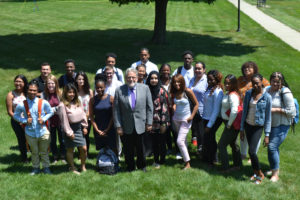
Last week, I had lunch with our new class of entering students who come to Sage through the Arthur O. Eve Higher Education Opportunity Program (HEOP). HEOP assists especially promising students, who, as a result of limited academic and financial resources, would otherwise not have the opportunity to attend The Sage Colleges. Part of that assistance is a five-week summer program on campus before the formal school year begins. The students take classes and workshops, make friends with each other and staff and peer tutors, and get acclimated to succeeding at Sage. Like most of our students, their routes to the first day of college are varied and often not simple, and like Sage students in general they are eager, lively and interesting young people.
In our lunch conversation, the program director asked what I expected from them as Sage students. I said some of the usual things: that I expected them to make the most of their opportunities, to go to class (!), to make use of all the resources we offer, to enjoy themselves and discover and pursue their passions.
But before I realized it, I added one thing that I expect of them and all our students: to register to vote and to vote in the upcoming election (and subsequent ones throughout their lifetimes). As I’ve written here earlier, I was shocked to learn that in the last midterm election, in 2014, college student turnout was only 18%–less than half the anemic 37% of the general population and far less than the 55% of Americans over 60 who voted.
That’s really poor. Fewer than 1 in 5 college students voted. 4 out of 5 apparently didn’t think it would make a difference, weren’t informed enough to understand the stakes, or simply didn’t care. When I look out at our students, I want their perspectives and voices to count, and I want them to care enough about the country they are inheriting to know what they need to know to be informed voters and citizens.
As much as I value the wisdom of age, I want young people to be active players on the political stage.
This fall at Sage, we will be running voter registration drives and offering non-partisan programming that engages all members of our community in the issues informing the midterm elections.
When I visit students at the start of the school year, I inevitably think about my 18-year-old freshman self. Perhaps I had a stronger interest in voting because I grew up during the tumultuous years of the Vietnam War. Perhaps I had more of an interest because I was old enough to care about the passage of the 26
th amendment to the constitution.
When I was fifteen years old, in 1971, the 26
th amendment to the constitution was passed, lowering the voting age from 21 to 18. This amendment (the fastest ever to be approved) was largely motivated by that very Vietnam War, which exacerbated a generation gap, and underscored that young people subject to the military draft at age 18, still could not vote.
So when I was 15 in 1971, the law changed, meaning I could vote in three years rather than having to wait six. Actually it was four years, since my birthday fell in late November, so the first national election I was eligible to vote in was the presidential election of 1975 (Carter vs Ford).
A few years ago, I got to know the retired senator who helped give 18-year-olds the vote: Birch Bayh of Indiana. He is the only person since the “founding fathers” to author more than one constitutional amendment. He wrote three actually, though only two became law. He is the author of the 25
th amendment which clarified presidential succession and allowed for the removal of a president for incapacity. He authored the aforementioned 26
th amendment which lowered the voting age to 18. He also drafted the Equal Rights Amendment, which passed both houses of Congress but failed to be ratified by the states.
Bayh then took one theme from the equal rights amendment, the concept of “eliminating sex discrimination in educational institutions on the basis of sex,” and enshrined it in the legislation known as the Higher Education Act, where it became “Title IX,” the basis for the equity of women’s collegiate athletics and protection from sexual harassment and assault.
Meeting Birch Bayh (who taught seminars at a college where I used to work) was a living reminder of how an individual can make a dramatic difference in the lives of others. Since my first voting, I have voted in ten subsequent presidential elections and ten midterm elections. I hope our students will do the same, and I suspect it will make a difference.
